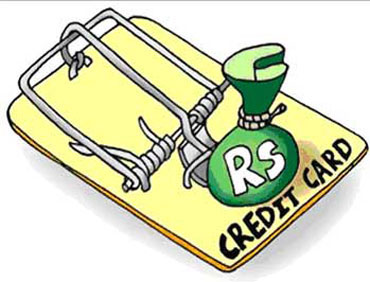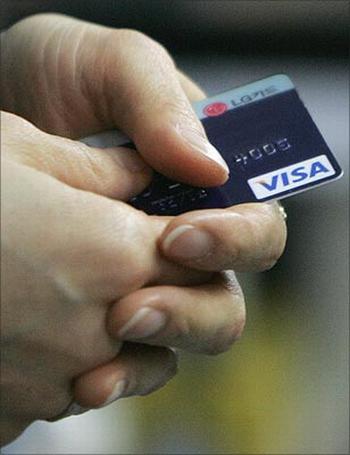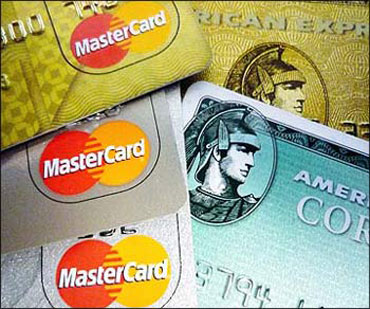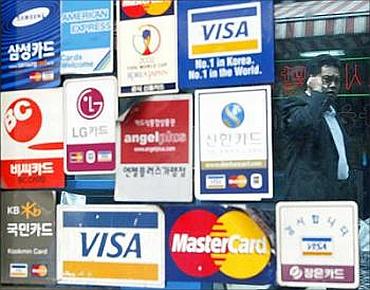 | « Back to article | Print this article |
How to manage credit card debt
Credit cards have changed our lives and our spending habits because of their sheer convenience. However, there is a danger that credit cards can tempt you to spend without foresight.
So it is important to ask certain questions: Do you know the interest rate on your credit card? Did you stop to read the fine print? Do you depend on your card and spend the maximum credit limit? Have you been paying only the minimum amount due or paying late?
Unfortunately not everyone is aware of the pitfalls of owning a credit card.
Take the instance of Sheena Agarwal who utilized her card for most of her expenses paying only her minimum amount due, which is usually about 5% of the total amount due.
Click NEXT to read on . . .
How to manage credit card debt
If you read the fine print that comes along with your monthly credit card statement you will notice an example of how long you will take to repay your total dues if you end up paying only the minimum amount.
An example states that if you spend Rs 5,000 and pay exactly the minimum amount due (subject to a minimum amount of Rs 100) every month, it will take you up to 6 years and 6 months to pay back the total amount.
Why? This is because when the amount is not paid in full the interest starts adding up cumulatively with interest charged on an average daily balance from the first day of purchase.
If you continue to use your card without paying up your dues in full, every new purchase will add on to the balance carried forward making you forfeit your free credit period (ranging anywhere between 18-40 days) depending on the date of purchase.
Click NEXT to read on . . .
How to manage credit card debt
When Sheena finally woke up to the fact that she was paying exorbitant interest for the purchases made, the debts had mounted to close to Rs 1 lakh (Rs 100,000). She was unsure of how to cope.
On a friend's suggestion, she opted for a personal loan to pay off her card debt in full. This way she would save considerably on interest cost, as the card interest will continue to spiral out of control and she will now need to pay only a fixed EMI to close her loan within a stipulated time period.
Typically credit card annualized interest rates range anywhere between 36 per cent and 48 per cent. While a personal loan interest rate can range between 14 per cent and 24 per cent. There is significant savings on interest to be had with the move!
You can also opt for a new credit card with a lower interest rate, which has 3-6 months of interest free period to pay your dues in full.
Click NEXT to read on . . .
How to manage credit card debt
This way you will pay out the card dues on your existing card and transfer the dues to a new card and pay the debt over an interest free period. Remember to stay away from making any purchases until the dues are paid and also be wary of the processing fee charges.
When the debt is too huge for you, a personal loan is still an option but it would be best to approach a debt counselling centre.
These centres have experts to help them with the best options to manage their money to their optimum advantage. Some of the options you can explore are Bank of India-supported Abhay (http:www.bankofindia.con/abhay.aspx) and ICICI Bank-backed Disha (http:www.dishafc.org).
It can help enormously because they will help you figure out how to calculate your net worth and safely liquidate some of your assets temporarily to pay off your debts. In situations where this cannot be done, they also help you negotiate with the bank to arrive at a mutually feasible solution.
Click NEXT to read on . . .
How to manage credit card debt
To sum up here are some ways to ensure that you get debt-free and stay that way!
1. Ensure that current debts do not exceed 40% of your current income. Always try to pay off the full amount due on the cards.
2. Depending on your debt situation you can choose a balance transfer on your card, take a personal loan or approach a debt counsellor.
3. To avoid future debts, track your daily spending for a month and distinguish between needs and wants.
4. Put aside three months of your pay into a separate account meant to serve as an emergency fund.
5. Try to save as much as 40 per cent of your income in a month.
Powered by
BankBazaar.com is an online marketplace where you can instantly get loan rate quotes, compare and apply online for your personal loan, home loan and credit card needs from India's leading banks and NBFCs.
Copyright 2024 www.BankBazaar.com. All rights reserved.




